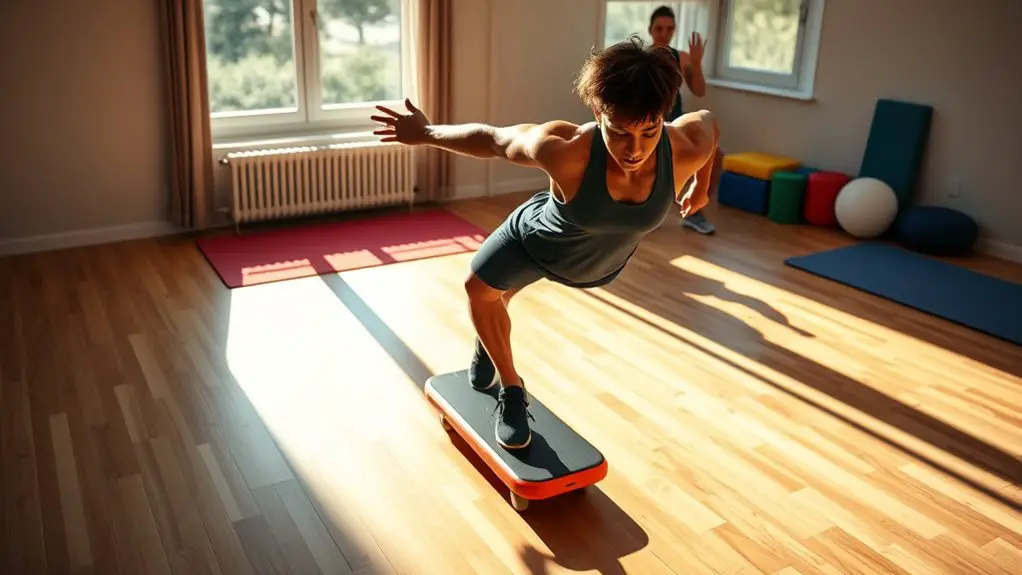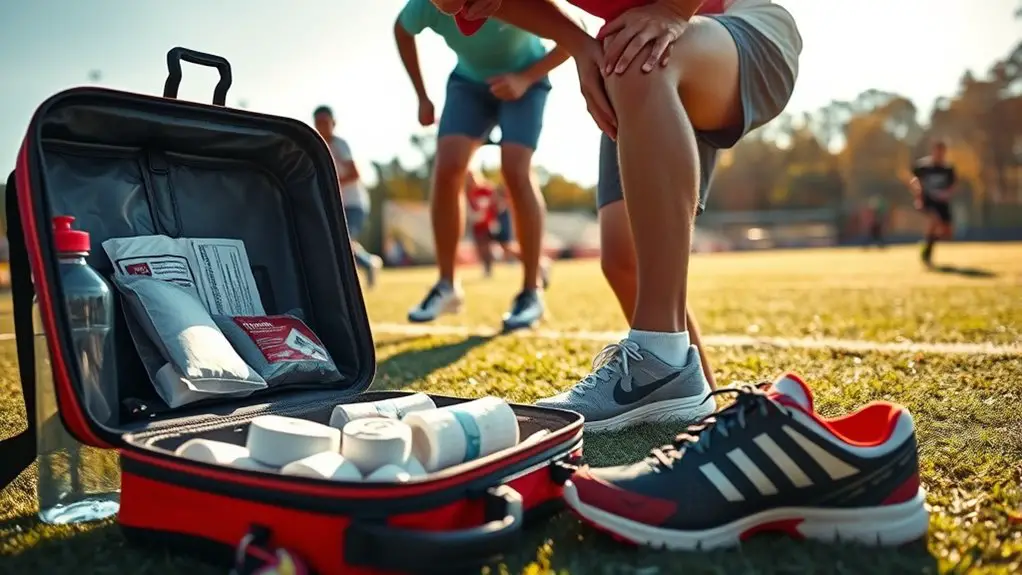Balance training has a profound impact on adaptive athletes. It boosts your stability, coordination, and confidence in various sports. By enhancing your core strength and proprioception, balance exercises reduce the risk of injury while improving mobility. Mastering these skills empowers you to tackle new challenges both on and off the field, leading to greater independence in daily activities. With tailored fitness programs and an inclusive environment, you'll find opportunities to thrive in your athletic journey. There's so much more to explore!
Understanding Balance Training
When you think about balance training, it's easy to overlook its importance, especially for adaptive athletes. Balance isn't just about staying upright; it's the foundation for freedom in movement. By mastering balance, you empower yourself to explore dynamic movements that enhance your performance and confidence.
Adaptive techniques are essential here, as they cater to individual abilities and needs. Whether you're using specialized equipment or adjusting your stance, these techniques help you build stability in various situations, allowing for greater mobility.
Incorporating exercises that challenge your balance can lead to improved coordination and strength. Think of activities that require shifting your weight or engaging your core; they'll not only boost your balance but also give you the liberty to push your limits. Embracing balance training means embracing the freedom to move, adapt, and thrive in any environment. Additionally, enhancing your proprioceptive abilities can significantly contribute to injury prevention, ensuring that you maintain stability and control during various activities.
The Importance of Balance for Adaptive Athletes
Balance is essential for adaptive athletes because it enhances stability and control in various sports. When you improve your balance, you also reduce the risk of injury, allowing you to train and compete more safely. Plus, better balance can lead to improved performance outcomes, helping you reach your full potential. Additionally, effective balance training reduces injury risk, which is crucial for adaptive athletes to ensure they can participate safely in their chosen sports.
Enhances Stability and Control
While you might not realize it, the foundation of stability and control is essential for adaptive athletes. Enhancing your dynamic balance through targeted stability techniques can truly transform your performance. By mastering these skills, you'll not only feel more confident but also gain the freedom to push your limits.
Consider these benefits:
- Improved body awareness
- Greater agility in movement
- Enhanced coordination
- Increased endurance
- Elevated mental focus
Each of these elements contributes to better overall performance. By incorporating balance training into your routine, you're setting yourself up for success. Embrace the journey of enhancing your stability and control, and watch how it opens up new avenues for achievement in your athletic pursuits.
Reduces Risk of Injury
Incorporating balance training into your routine not only enhances your performance but also greatly reduces the risk of injury. For adaptive athletes, mastering stability is vital in maneuvering the unique challenges of your sport. By focusing on injury prevention strategies, you can strengthen your body's support systems, allowing you to stay active and engaged without the fear of setbacks. Balance training sharpens your reflexes, improves coordination, and builds confidence, all essential for adaptive sports safety. You'll find that a solid foundation in balance not only protects you from falls or strains but also empowers you to explore your physical limits. Embrace balance training, and enjoy the freedom it brings in your athletic journey!
Improves Performance Outcomes
A solid foundation in stability not only protects you from injuries but also enhances your overall performance in adaptive sports. When you focus on balance training, you open the door to improved performance outcomes. You'll notice changes in your performance metrics, making it easier to measure your progress.
- Greater agility and speed
- Enhanced coordination and control
- Increased confidence in skills
- Better endurance during activities
- Accelerated skill acquisition
These benefits empower you to push your limits and experience the freedom of movement. With consistent balance training, you're not just honing your skills; you're transforming how you approach your sport. Embrace the journey, and let your newfound stability elevate your performance to new heights.
Enhancing Stability Through Balance Exercises
To enhance your stability, focusing on balance exercises can make a significant difference. These exercises not only build your core strength but also improve your proprioception skills. By incorporating them into your routine, you'll notice greater control and confidence in your movements. Additionally, strong core muscles create a solid foundation for all movements, enhancing stability and balance during various activities.
Core Strength Development
While many athletes focus on strength training, developing core strength is essential for enhancing stability and overall performance. A strong core isn't just about looking good; it's about achieving functional strength that supports your movements. Balance exercises can help you build core stability, allowing you to perform better in your sport and daily activities.
- Engaging in planks to improve endurance
- Incorporating stability balls for dynamic challenges
- Practicing balance boards to enhance coordination
- Using resistance bands for targeted strength
- Performing rotational exercises to boost agility
Improved Proprioception Skills
Improved proprioception skills are essential for adaptive athletes, as they enhance stability and reduce the risk of injury. Engaging in proprioceptive training helps you develop a keen awareness of your body's position in space. By focusing on sensory integration, you learn to coordinate movements more effectively, which is vital for maintaining balance during various activities. Simple exercises like balance boards or single-leg stands can greatly sharpen your proprioceptive abilities. As you enhance these skills, you'll notice greater confidence and freedom in your movements, allowing you to push boundaries and explore new challenges. Remember, the stronger your proprioceptive skills, the more capable you become in maneuvering your environment safely and efficiently. Embrace the journey toward improved stability!
Improving Coordination and Mobility
Enhancing coordination and mobility is essential for adaptive athletes, as it directly impacts their performance and overall confidence. By improving your motor skills, you can execute functional movements more effectively, giving you the freedom to explore your athletic potential. Here are some key benefits of balance training:
- Increases stability during dynamic activities
- Improves reaction times and agility
- Enhances spatial awareness and body control
- Boosts endurance through better energy management
- Promotes injury prevention by strengthening supporting muscles. Additionally, balance training can serve as a foundation for enhancing flexibility, enabling athletes to move more freely and efficiently.
Boosting Confidence in Athletic Performance
As you develop your coordination and mobility, you'll likely notice a boost in your confidence on the field or court. This confidence building is essential; it empowers you to push your limits and embrace new challenges. When you feel more balanced, you're not just moving better; you're performing better. Enhanced performance leads to greater enjoyment of your sport, which feeds back into your self-assurance.
Every time you nail a tricky maneuver or stay steady during a game, you reinforce that inner belief. This cycle of performance enhancement and confidence growth becomes a driving force, inspiring you to set higher goals. You'll find yourself taking risks you might have shied away from before, as each success builds your self-esteem. Embracing balance training isn't just about physical gains; it's about releasing your potential, both on and off the field, and truly enjoying the freedom that comes with it. Additionally, focusing on consistent preparation through practice can significantly elevate your performance and confidence in sports.
Reducing the Risk of Injury
While it may seem counterintuitive, balance training is one of the most effective ways to reduce the risk of injury for adaptive athletes. By incorporating balance exercises into your routine, you can enhance your body's stability and coordination, essential components in injury prevention strategies. Here's how balance training helps:
- Strengthens stabilizing muscles
- Improves proprioception and awareness
- Enhances reaction time to prevent falls
- Supports rehabilitation techniques for previous injuries
- Boosts confidence in movement
These benefits collectively lower your likelihood of experiencing injuries during training or competition. As you engage in balance training, you'll not only cultivate strength and agility but also empower yourself to embrace your athletic journey. Remember, the more you invest in your balance, the freer you become to explore new challenges without the worry of setbacks. Prioritize balance training, and you'll pave the way for a safer, more fulfilling athletic experience. Additionally, incorporating proper warm-up techniques before balance training can further enhance your injury prevention efforts.
Fostering Independence in Daily Activities
Fostering independence in daily activities is essential for adaptive athletes, as it empowers you to navigate your environment with confidence and self-sufficiency. When you integrate balance training into your daily routines, you create a solid foundation for personal growth. Mastering balance can enhance your ability to perform everyday tasks, such as walking, reaching, or even cooking, without relying heavily on assistance.
As you become more adept, you'll notice a shift in your mindset—embracing challenges rather than shying away from them. This newfound independence allows you to engage fully in life, making choices that align with your desires and goals. You'll find joy in accomplishing tasks that once seemed intimidating, leading to a greater sense of freedom. Ultimately, enhancing your balance doesn't just improve your physical capabilities; it also enriches your overall quality of life, paving the way for lasting independence.
Tailored Fitness Programs for Adaptive Athletes
When you think about achieving your fitness goals, tailored programs can make all the difference for adaptive athletes. These individualized programs focus on your unique needs and abilities, empowering you to thrive in your fitness journey.
Consider these key aspects of adaptive fitness:
- Personalized Assessment: Understanding your strengths and limitations.
- Flexible Workouts: Adapting exercises to fit your lifestyle.
- Skill Development: Building on your current abilities for improvement.
- Motivation and Support: Having a coach or community that encourages you.
- Progress Tracking: Monitoring your growth and adjusting as needed.
Additionally, incorporating mindfulness practices can help adaptive athletes manage stress and enhance their overall performance.
Creating an Inclusive Sports Environment
An inclusive sports environment is essential for adaptive athletes to truly thrive and feel a sense of belonging. You want to foster a space where every individual, regardless of ability, can participate freely and joyfully. This begins with inclusive coaching that emphasizes understanding and support, ensuring that coaches are trained to recognize the unique needs of adaptive athletes.
It's vital to provide adaptive equipment that caters to different abilities, allowing athletes to engage fully in their chosen sports. When you create a setting that embraces diversity, you empower athletes to push their limits, build confidence, and form connections.
Encouraging teamwork and camaraderie among all participants fosters a culture where everyone feels valued. Remember, inclusivity isn't just about accessibility; it's about creating a community where every athlete can express themselves and pursue their passion for sports without barriers.
Frequently Asked Questions
What Equipment Is Needed for Balance Training at Home?
When you're setting up for balance training at home, you'll want some key equipment. Balance boards are fantastic for improving stability and coordination, while stability balls can enhance your core strength and balance. Both are versatile and can be used for various exercises. With just these two pieces, you can create a dynamic workout space that lets you explore your limits and build your balance skills in a fun, engaging way.
How Often Should Adaptive Athletes Practice Balance Exercises?
Imagine standing on the edge of a cliff, wind in your hair, ready to soar. To achieve that freedom, balance is key. For adaptive athletes, the frequency recommendations suggest practicing balance exercises 3-4 times a week, with training durations of 20-30 minutes per session. This consistent practice not only builds strength but also fosters confidence, allowing you to embrace life's challenges while finding your own wings to fly.
Can Balance Training Be Integrated Into Team Sports?
Absolutely, balance training can be seamlessly integrated into team sports. It not only enhances individual skill development but also strengthens team dynamics. When you work on balance together, you're fostering trust and communication, which are vital in any team setting. Plus, incorporating fun balance challenges during practice can keep everyone engaged and motivated. So, don't hesitate to make it a part of your training routine; it'll benefit both you and your teammates!
What Age Groups Benefit Most From Balance Training?
Imagine balance training as the bridge connecting childhood exuberance and senior serenity. For kids, it's essential for child development, enhancing coordination and confidence, while seniors find renewed strength and stability, promoting wellness as they navigate life's changes. Both age groups can soar; children build a solid foundation for active lives, and older adults reclaim their freedom, dancing through daily tasks with grace. So, no matter your age, balance training's benefits are clear and profound!
Are There Online Resources for Adaptive Balance Training Programs?
Absolutely, there are plenty of online resources for adaptive balance training programs. You can find virtual coaching options that tailor adaptive techniques to your needs, helping you improve your balance from the comfort of your home. Many websites and platforms offer guided sessions and instructional videos, so you can choose what fits your style and schedule. Embrace the freedom to enhance your skills at your own pace and on your terms!




